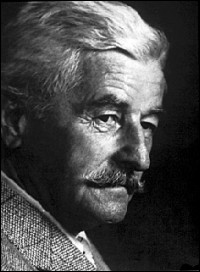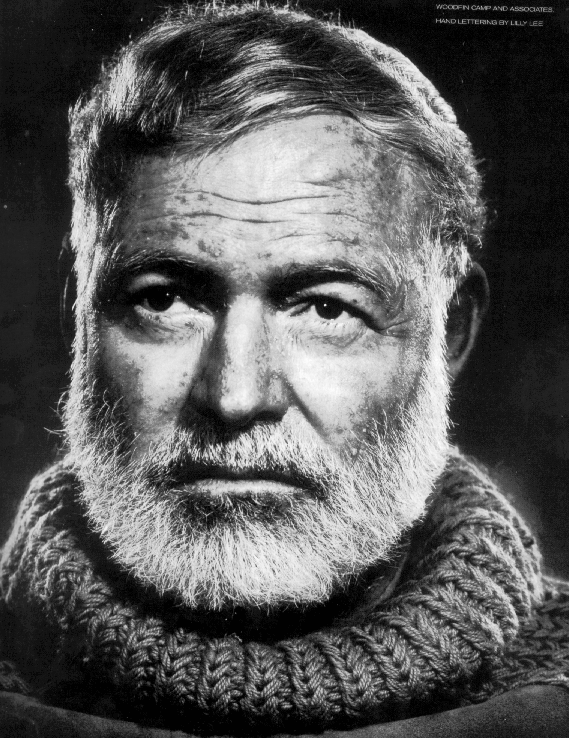“To Sherwood Anderson through whose kindness I was first published, with the belief that this book will give him no reason to regret that fact.”
Faulkner’s dedication in Sartoris.” (18)
 Sherwood
Anderson was more than just a brilliant author; he was also a vital instrument
in the development of some of the greatest American authors like William Faulkner
and Ernest Hemingway. Anderson should be credited for helping both these authors
get recognized and helping them fine-tuning their first novels. The relationship
between William Faulkner and Sherwood Anderson was that of a mentor and a
mentee. Faulkner first sought out Anderson after reading “I’m
a Fool” because William believed that it was t
Sherwood
Anderson was more than just a brilliant author; he was also a vital instrument
in the development of some of the greatest American authors like William Faulkner
and Ernest Hemingway. Anderson should be credited for helping both these authors
get recognized and helping them fine-tuning their first novels. The relationship
between William Faulkner and Sherwood Anderson was that of a mentor and a
mentee. Faulkner first sought out Anderson after reading “I’m
a Fool” because William believed that it was t he
best short story ever written. After the two authors met, Anderson took Faulkner
under his wing and decided to help build up his career. Anderson encouraged
Faulkner to write about his personal experiences in his novels, which enriched
Faulkner's works. The two authors were quite close (they even lived together!)
and Anderson quickly found publishers to help Faulkner get started on his
career. “Faulkner’s complex relationship with Anderson was composed
of strongly compounded of apprenticeship and rejection, loyalty and rebellion.”
(19) Unfortunately, things did not end very well between
Faulkner and Anderson. This began when Sherwood first fought out that Faulkner
was lying about his past history in order to impress Anderson. In addition
to that, William began to rebel from Anderson’s mentoring by publicly
insulting Sherwood’s works, including the infamous, Winesburg, Ohio.
he
best short story ever written. After the two authors met, Anderson took Faulkner
under his wing and decided to help build up his career. Anderson encouraged
Faulkner to write about his personal experiences in his novels, which enriched
Faulkner's works. The two authors were quite close (they even lived together!)
and Anderson quickly found publishers to help Faulkner get started on his
career. “Faulkner’s complex relationship with Anderson was composed
of strongly compounded of apprenticeship and rejection, loyalty and rebellion.”
(19) Unfortunately, things did not end very well between
Faulkner and Anderson. This began when Sherwood first fought out that Faulkner
was lying about his past history in order to impress Anderson. In addition
to that, William began to rebel from Anderson’s mentoring by publicly
insulting Sherwood’s works, including the infamous, Winesburg, Ohio.

New Orleans, where Anderson spent alot of his time with Faulkner.
 Sherwood Anderson and Ernest Hemingway developed a relationship that was quite
different from Anderson’s relationship with Faulkner. Although Hemingway
learned and gained a lot from his connections with Anderson, they only corresponded
for about four to five months. When Anderson first met Hemingway, he was intrigued
by his ability to write. After their first few evenings working together,
Hemingway began to not see eye to eye on a number of things. Both authors
were quite passionate and the similarities between them seem to cause tension.
In the beginning, Hemingway really respected Anderson’s advice. For
example, Anderson advised Hemingway that he should go to Paris and learns
how
Sherwood Anderson and Ernest Hemingway developed a relationship that was quite
different from Anderson’s relationship with Faulkner. Although Hemingway
learned and gained a lot from his connections with Anderson, they only corresponded
for about four to five months. When Anderson first met Hemingway, he was intrigued
by his ability to write. After their first few evenings working together,
Hemingway began to not see eye to eye on a number of things. Both authors
were quite passionate and the similarities between them seem to cause tension.
In the beginning, Hemingway really respected Anderson’s advice. For
example, Anderson advised Hemingway that he should go to Paris and learns
how  to
write well there; in addition to that, Anderson also told Hemingway that he
should write about experiences that he knows about, like war and love. Sherwood
introduced Hemingway to many different people all over the world, including
publishing companies. But Anderson was a much larger figure than Hemingway
was, which seemed to bother him greatly. Hemingway was quite jealous of the
attention that Anderson always received from fans and friends, as well as
other women.(20) Although Anderson’s relationship
did not end well with Hemingway, his influence on Hemingway is still evident.
Hemingway is often referred to as “the successor in midwestern imagination
from Anderson.” (21)
to
write well there; in addition to that, Anderson also told Hemingway that he
should write about experiences that he knows about, like war and love. Sherwood
introduced Hemingway to many different people all over the world, including
publishing companies. But Anderson was a much larger figure than Hemingway
was, which seemed to bother him greatly. Hemingway was quite jealous of the
attention that Anderson always received from fans and friends, as well as
other women.(20) Although Anderson’s relationship
did not end well with Hemingway, his influence on Hemingway is still evident.
Hemingway is often referred to as “the successor in midwestern imagination
from Anderson.” (21)